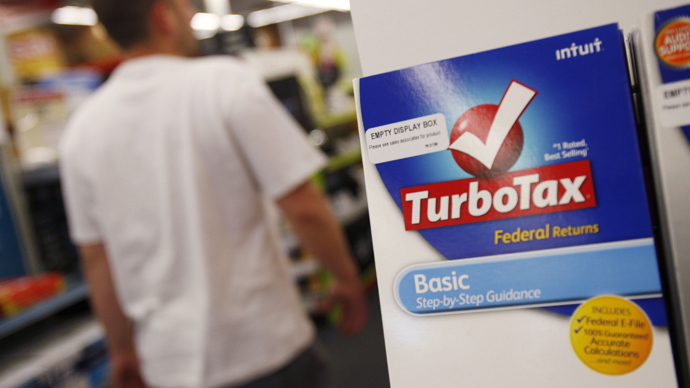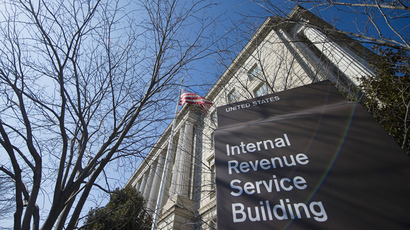TurboTax maker spending millions to kill simplified IRS tax filing

A software company that promises to help Americans avoid the annual misery of filing their IRS returns has, in fact, spent years trying to convince lawmakers to make sure filing taxes remains difficult, thus protecting its business, a new report found.
Every year Americans spend an estimated $2 billion and 225 million hours preparing their tax returns by April 15. The process can include obtaining information from a bank or employer, intensive financial disclosures, and, for many Americans, an appointment with a professional accountant who is qualified to evaluate how much money the state and federal government is due.
The annual drudgery could be avoided with “return free-filing.” The process would involve an Americans’ employer and bank sending information to the US Internal Revenue Service (IRS), the government sending a bill to an individual, and that person essentially returning their payment in mere minutes, free of charge.
Denmark, Sweden, and Spain already rely on pre-filed returns, and the US couldas well if it were not for Intuit Inc. The owner of Turbo Tax, Intuit has spent at least $11.5 million on a federal lobbying effort over five years (spending more than Amazon or Apple) in an attempt to make sure the way Americans pay their taxes doesn’t change. The ploy was first unveiled by a ProPublica investigation last year, although reporters found that Intuit used the same tricks through spring of this year.
Lobbyists have portrayed return free-filing as a big-government intrusion, although the idea has previously been endorsed by Republican President Ronald Reagan and Democratic President Barack Obama when he was campaigning in 2008. William Gale, co-director of the Urban-Brookings Tax Policy Center, told ProPublica return free-filing is the next logical step for frustrated taxpayers.
“This is not some pie-in-the-sky that’s never been done before,” he said. “It’s doable, feasible, implantable, and at a relatively low cost.”
Intuit asserts that permitting the IRS to prepare tax returns would, in a circumspect way, actually cost taxpayers more money in the long run. The company, with help from conservative anti-tax advocate Grover Norquist, lobbied on at least two bills (first in 2007 then again in 2011) that would have prevented the Treasury Department from launching return-free filing.
The tactics are not always pretty. ProPublica discovered that a rabbi, small town mayor, an NAACP official, and various other community leaders from starkly different background had all either written to their local representative or penned editorials in newspapers calling for the same concession: ban pre-filled tax returns.
Without offering many specifics, Rabbi Elliot Dorff warned that the plan would victimize low-income earners. He described “shudder[ing] at the impact this program will have on the most vulnerable people in American society.”
Dorff later admitted he was approached by a former student named Emily Pflaster and asked to use his status to get the word out about the possible dangers present within return-free filing. What the rabbi did not know was that Pflaster worked for a public relations firm that had been hired by Intuit to work against the new idea.
“I wish she would have told me that,” he said later.
Experts maintain that Intuit’s warnings are gross exaggerations motivated by nothing more than profit margins. Paul Caron, a tax professor at University of Cincinnati College of Law, told ProPublica he is “shocked as a tax person and citizen that this hasn’t happened by now.” The IRS would merely shift its schedule, making its tax circulation information available before the public files taxes instead of after, when it checks a return.
“When you make an appointment for a car to get serviced, the service history is all there,” Caron said. “Since the IRS already has all that info anyway, it’s not a big challenge to put it in a format where we could see it. For a big slice of the population, that’s 100 percent of what’s on their tax return.”
Grover Norquist, the founder and president of Americans for Tax Reform which is against all tax hikes, described the idea in a letter to former US President George W. Bush as an IRS plan to “socialize all tax preparation in America.”
Intuit has for years tried to eliminate a 2005 California pilot program called ReadyReturn, which was popular with lawmakers in both parties. Intuit dedicated over $3 million to fighting the idea with lobby battles and political campaigns throughout the state. Intuit spokeswoman Julie Miller told the Los Angeles Times in 2006 the notion of a return-free filing was “a fundamental conflict for the state’s tax collector and enforcer to also become the people’s taxpayer.”
Tom Campbell, a former California legislator was on the front lines of the PR battle, wrote his own LA Times op-ed, saying he “never saw as clear a case of lobbying power putting private interests first over public benefit.”
“The government imposed the tax burden in the first place,” Campbell told ProPublica years later. “So if it wants to make it easier, for heaven’s sake, why not?”














